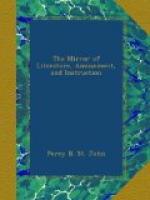the youthful pair. I inquired of my ancient conductress
the history of this picture, and whether the beautiful
female was not an ideal being? “Alas!”
said she, “it commemorates a heavy day for the
house of D——; on that day the last
and fairest of its race sunk the victim of unrequited
affection. That is her picture; but, oh! her
soul was more angelic than her person; she”—but,
reader, let me give the story in my own words.
The Lady Isabel was the last descendant of the family
of D——; her father had fallen in
battle; his lady did not long survive him; and thus,
at an early age, Isabel became an orphan. Her
mother’s brother was appointed her guardian,
and, with his son Albert, came to reside at the Castle.
The children, thus insulated from the world, and educated
entirely at home, saw nothing so worthy to be loved
as each other, and their attachment was as romantic
as the scenes around them. They both (but particularly
Isabel) delighted in the high chivalrous legends of
antiquity—and the tales of eternal constancy
and self-devoted affection recorded of some of the
earlier heroines of her family, were read with sacred
veneration by the young enthusiast. In a mind
of ordinary temperament, little harm would have resulted
from the indulgence of such a taste; to the impassioned
soul of Isabel it was destructive and fatal.
Deprived by death of the mother who might have taught
her to restrain and regulate her ardent feelings,
they acquired by neglect additional strength, and
eventually concentrated into a passion deep and lasting
as her existence. As years passed on, so did her
love increase; she regarded Albert as the perfection
of human excellence, and worshipped him with all the
full devotedness of her warm heart. It was not
so with Albert; he thought of his fair cousin with
pride—with tenderness; but it was only
the calm affection of a brother: other feelings
than those of love possessed him—he languished
for fame, for honourable distinction among his fellow
men, and at length left his peaceful home, and the
sweet companion of his youth, to fight the battles
of his country. His career was glorious; and after
an absence of three years, he was recalled by the
death of his father. Isabel welcomed him with
rapturous joy; he embraced her with a brother’s
fondness, and gazed with delight on her improved beauty.
He suspected not that she loved him with more than
a sisterly affection, and thought not of the wound
he was about to inflict on this tender, enthusiastic
being. He told her of his attachment to a fair
girl, who had consented to become his bride at the
expiration of the term of mourning for his father.
She heard him with death-like silence, checked the
groan that was bursting from her agonized heart, and
strove to assume a look of cheerfulness. Retired
to the solitude of her apartment, she wept in bitter
anguish—her young soul was blighted; she
had nothing left to live for; hope, happiness, and
love were at an end; for love would now be guilt.




